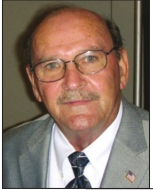AWESOME HONOR

LSU Hall of Fame icing on the cake
It was a surprise and an awesome honor to receive the telephone call from Dean Jerry Ceppos of the LSU Manship School of Mass Communications informing me that I had been selected for its Hall of Fame. The Hall of Fame was created in 1975 and honors alumni whose distinguished careers have contributed to or reflect credit on the various academic programs in the school.
As I look back over my career, two people were influential in determining its course. The first was Dr. Al Delahaye, whom I met when I went to Nicholls State College in Thibodaux after I had graduated from high school in 1959. When he asked me what I wanted to major in, I said, "I don’t know." So he said, "How about journalism?" I spent two years at Nicholls under the watchful eye of Dr. Delahaye. He became my mentor.
After two years at Nicholls, I transferred to LSU to pursue my career in journalism. I became sports editor, managing editor for two terms, and editor of the Daily Reveille, the college newspaper. I was a bit of a rebel. As sports editor, I defended Coach Paul Dietzel’s move to West Point. My thinking was, if a college football coach could be fired, then one could quit on his contract to take a position he has always dreamed of.
The reaction was immediate. LSU alumni, furious with Dietzel for leaving, turned on me as well. I weathered that storm and later received a letter from Dietzel explaining why he took the position at West Point, which I published in the Reveille. When I was managing editor, the big rivalry for the LSU Tigers was the Ole Miss Rebels. When rumors surfaced on campus that the Reveille had been told not to use the famous cry of "Go to Hell, Ole Miss," I put a banner headline in red ink on the front page saying just that. The students and alumni were happy with that. The administration of the journalism school, not so much.
But where I really got into trouble was when I was editor and penned an editorial saying that the LSU football team needed to accept black athletes and that the team needed to play teams with black players. The sky came falling down. Alumni were really furious and wanted me expelled from the university. And that little piece of writing got me an invitation to the office of the president, Dr. John Hunter. I thought, this is it. I will be expelled.
But Dr. Hunter was a reasonable man.
He said he had been watching my work on the Reveille and that I was not very popular with the alumni. He then asked where I was from. I told him from Gibson. He sat back in his chair and said, "No kidding.
I’m from Donner. We’re just two coonasses." The two little communities were about 10 miles apart in South Louisiana. He said he had my back, but to try and not stir up the alumni again. I didn’t. As an aside, it was 1972 before the LSU Tigers had its first black athlete.
After getting my B.A.J., I entered graduate school and worked in the Bureau of Public Relations for two years so I could pay my way. Toward the end of graduate school, my life took another turn. I got a call from Dr. Frank Price, who was head of the journalism school, saying I would be getting a call from Congressman F. Edward Hebert, who was a very powerful member of Congress from New Orleans. Dr. Price said he was looking for a press secretary and that he had recommended me.
That, in itself, was most surprising. I had given a lot of grief to Dr. Price during my time on the Reveille staff, as mentioned above. And we were never very close, as I was with the journalism professors. But of all the people he had to choose from, Dr. Price chose me. I am very grateful for his recommendation because it started a 27-year career on Capitol Hill in
Washington, D.C. I had been thinking I would take a job teaching in college. Back then, that would keep you out of the draft, and Vietnam was heating up. I had gone for an interview in Pensacola at a new junior college that was opening. The chancellor said he would call me on Monday. The call never came, so I thought I did not get the job. Hebert called on Tuesday and set up a meeting in New Orleans. On Wednesday, the chancellor called and said the job was mine and that he had not called because of a death in the family. It’s funny how things work out.
I have been real fortunate. Hebert treated me like the son he never had. My next boss, Congressman Jerry Huckaby, treated me as a member of the family. Mayor Bo Williams and I became good friends after serving as his executive assistant. And Jay Covington and Hugh Johnson at The Forum, where I have written since 1999, are dear friends. You can’t ask for better than that. The LSU Hall of Fame is just icing on the cake.
Lou Gehrig Burnett, an award-winning journalist, has been involved with politics for 44 years and was a congressional aide in Washington, D.C., for 27 years. He also served as executive assistant to former Shreveport Mayor “Bo” Williams. Burnett is the publisher of the weekly “FaxNet Update” and can be reached at 861-0552 or louburnett@comcast.net.
